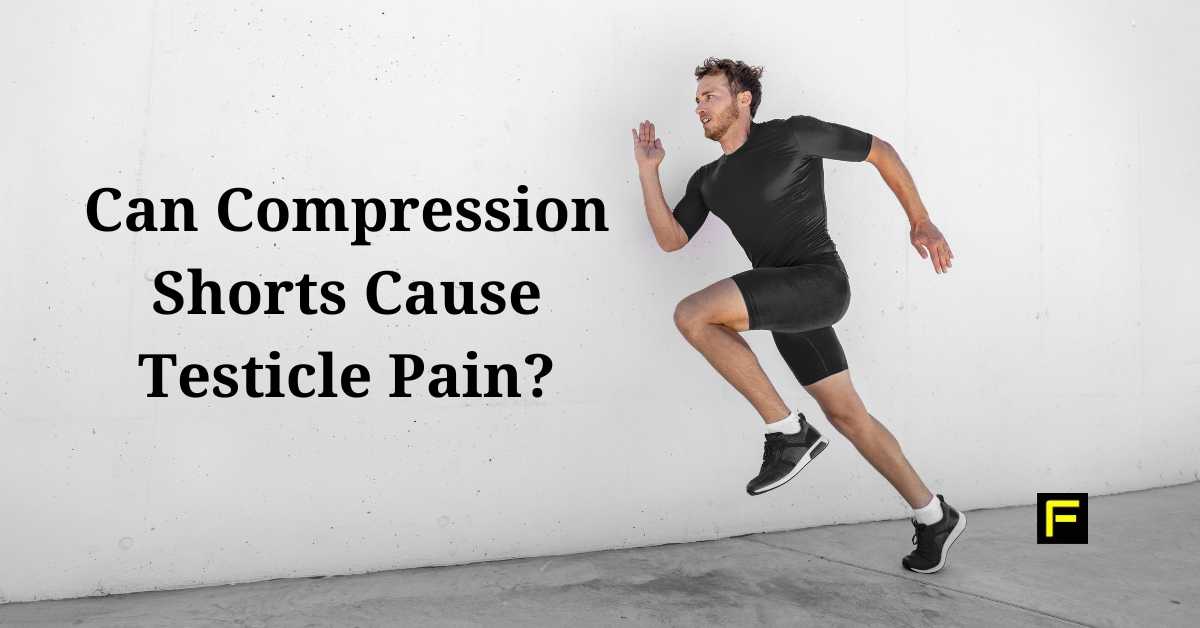Can Compression Shorts Cause Testicle Pain? Compression shorts are athletic wear designed to support muscles during physical activity. They can enhance performance and reduce the risk of injury. Some individuals have reported experiencing testicle pain after wearing such gear.
The concern arises from the tight fit, which, while intended to provide muscle stability, could inadvertently cause discomfort or restrict blood flow in sensitive areas such as the groin.
While compression shorts are generally safe, it is important to consider fit, duration of wear, and the activities during which they are worn. Tighter isn’t always better.
Excessively snug compression wear, especially around the groin, can lead to various issues including pain or numbness in the testicles. It’s important to balance the benefits of compression with the potential risks to ensure a comfortable and safe experience while engaging in sports or physical exercise.
Key Takeaways
- Compression shorts are meant to support muscles, though improper use can lead to discomfort.
- Choosing the right fit is essential to avoid testicle pain and other potential issues.
- Consult a medical professional if you experience persistent or severe pain after wearing compression shorts.
Understanding Compression Shorts
- Nike Dri-FIT technology moves sweat away from your skin for quicker evaporation, helping you stay dry and comfortable
- Mesh at the inseam and upper seat lets air flow to help keep you cool
- Care Instructions: Machine Wash
Compression shorts are tight, form-fitting garments often used by athletes to support muscles during physical activity. They’re designed to hug your body snugly and are generally made from a stretchy, resilient material like a blend of elastane, also known as Spandex, and nylon.
Purpose
The main aim of these shorts is to reduce muscle fatigue and strain by providing support and increasing blood circulation.
Benefits
- Keep muscles warm
- Reduce chafing and skin irritation
- Provide comfort and possibly enhance performance
When selecting compression shorts, it’s important to consider a few things such as the level of compression, size, and material. A proper fit is crucial—shorts that are too tight might restrict movement or blood flow, while those too loose won’t provide enough benefit.
Here are some considerations for finding the right fit:
- Size: Follow the manufacturer’s sizing guide.
- Compression level: Look for mild to moderate compression unless otherwise recommended by a professional.
- Material: Opt for moisture-wicking fabrics to stay dry.
Remember, compression shorts should feel snug but not painfully tight. If you experience discomfort or pain around the testicle area, it could be a sign that your shorts are too tight or not fitting correctly. Always listen to your body and adjust the fit or try different brands to ensure maximum comfort and benefit.
Potential Causes | Can Compression Shorts Cause Testicle Pain?
While considering the impact compression shorts may have on testicle pain, it’s important to understand various factors that can contribute to this discomfort.
Compression and Pressure
Compression shorts are designed to fit snugly. If they’re too tight, they can apply excessive pressure to your groin area, potentially leading to discomfort or pain in your testicles.
Material and Fit Issues
The material of the compression shorts can cause irritation or allergic reactions if you have sensitive skin. Moreover, a poor fit can contribute to chafing, which in turn can lead to testicle pain.
Duration of Wear
Wearing compression shorts for extended periods can increase the risk of pain. It’s essential to limit the duration of wear to prevent the build-up of heat and moisture, which could exacerbate any discomfort.
Pre-existing Health Conditions
If you have any pre-existing conditions like epididymitis or varicocele, wearing compression shorts may aggravate these conditions, leading to enhanced testicle pain. It’s best to consult with a physician if you’re experiencing ongoing pain.
Benefits of Compression Shorts
When considering compression shorts, you might be interested in how they can support your active lifestyle. Here’s what you need to know about the benefits:
Enhancing Performance
Compression shorts are designed to hug your muscles snugly. This snug fit is believed to support your muscles during physical activities, potentially leading to improved athletic performance. They minimize excessive muscle motion, which can translate into better efficiency and movement precision during your workouts.
Improving Blood Flow
Compression technology has been touted for its ability to promote blood circulation. By applying gentle pressure to your muscles, compression shorts can facilitate increased blood flow which contributes to a quicker delivery of oxygen to the working muscles. This may aid in your performance and the recovery process after exercise.
Reducing Muscle Fatigue
Another benefit you’ll appreciate is their role in reducing muscle soreness. By compressing your muscle tissue, these shorts might help in reducing the vibration and oscillation as you move, which can lead to decreased muscle fatigue. This means you could potentially exercise longer without feeling worn out too quickly.
Choosing the Right Compression Shorts
To ensure comfort and avoid testicular pain, selecting the right compression shorts is crucial. Here’s how to find the best pair for your needs.
Size and Fit Recommendations
The key to a good pair of compression shorts is a snug fit that doesn’t constrain your body. Measure your waist and hips accurately and refer to the manufacturer’s size chart. Ensure there’s enough stretch to allow full range of motion without any pinching or discomfort.
Material Considerations
Opt for a fabric that wicks moisture away to keep you dry during workouts. A blend of polyester and spandex usually offers an optimal balance of elasticity and breathability. Also, look for flatlock seams to minimize irritation and ensure durability.
Design and Style Options
Compression shorts come in various lengths and styles, so choose according to your sport’s demands. Some include built-in protective cups to safely support the testicles during contact sports, while others are designed for running or biking with a focus on muscle support and increased blood flow.
Safe Usage of Compression Shorts
When using compression shorts, it’s essential to consider fit, duration, and tightness to avoid discomfort or potential health issues such as testicle pain.
Correct Sizing
Finding the right size for your compression shorts is crucial. They should fit snugly but not so tight that they restrict blood flow to the groin area.
Always refer to the manufacturer’s sizing chart; if you’re between sizes, it’s typically advisable to try the larger size to prevent excessive pressure.
Proper Wearing Duration
Be mindful of how long you wear compression shorts. For most, wearing them during exercise and for a short period afterward is typically safe.
Wearing compression shorts for extended periods, especially if they’re overly tight, might lead to issues like reduced heat dissipation and hindered sperm production.
You may also be interested in learning how to wash compression shorts as well.
Balanced Tightness
The level of tightness should be just enough to provide support without causing discomfort.
While some support is beneficial, too-tight compression wear can restrict blood flow and lead to pain. Ensure that your compression shorts are not causing indents in your skin or creating a feeling of numbness in your thighs or groin.
When to Seek Medical Advice
If you’re experiencing discomfort due to compression shorts, it’s important to know when it’s just irritation or a sign of something more severe. Here’s how to determine if you need to consult a doctor.
Symptoms to Watch For
- Sudden, intense pain: A warning sign that may indicate a serious condition such as testicular torsion, which requires immediate medical attention.
- Swelling or changes in skin color: Could suggest an injury or an infection that needs professional assessment.
- Discomfort during urination: This symptom, particularly if combined with discharge, could be an indication of an infection like epididymitis.
Consulting a Healthcare Professional
- Persistent or worsening pain: If the discomfort doesn’t improve or intensify over time, it’s time to see a doctor.
- Pain after reducing physical activity: Even if you’ve taken a break from activities that might cause pain, such as cycling, and the pain persists, seek medical advice to rule out other causes.
Frequently Asked Questions
Compression shorts are popular among athletes for support and performance enhancement. However, you may have concerns about their impact on testicular health. Let’s address some common inquiries regarding compression wear and testicular pain.
Can wearing tight clothing lead to testicular discomfort?
Yes, tight clothing, like compression shorts, can potentially lead to testicular discomfort. The pressure and constriction may cause pain or aching in your testicles.
What could cause one testicle to be more sensitive than the other?
One testicle could be more sensitive than the other due to a variety of issues, including infections, injuries, or conditions like epididymitis or testicular torsion. It’s important to consult a healthcare provider if you notice sensitivity or pain in one testicle.
Are there any negative effects associated with wearing compression shorts?
Wearing compression shorts can lead to negative effects such as overheating, skin issues, or even pain if worn too tightly or for too long without appropriate breaks.
Is it safe to wear compression shorts for extended periods throughout the day?
It’s generally safe to wear compression shorts for extended periods, but you should ensure they fit properly and are not too tight to avoid discomfort or circulatory issues.
How can one instantly alleviate testicle pain?
If you’re experiencing testicle pain, you can try elevating the scrotum or applying a cold pack for immediate relief. But if pain persists, it’s crucial to seek medical attention.
Does engaging in physical exercise impact the size of your testicles?
Physical exercise is not typically linked to a permanent change in the size of your testicles. However, temporary changes are usually related to the body’s response to temperature and physical activity.

Rick Huey is a fitness writer who has dedicated his life to living an active lifestyle. With more than 30 years of experience in the fitness industry, Rick is a respected contributor for FitFab50.com, where he shares his wealth of knowledge with a wide audience. His dedication to promoting the benefits of living an active lifestyle has inspired many people to pursue their own fitness journeys with enthusiasm and dedication.
Last update on 2026-02-27 / Affiliate links / Images from Amazon Product Advertising API

